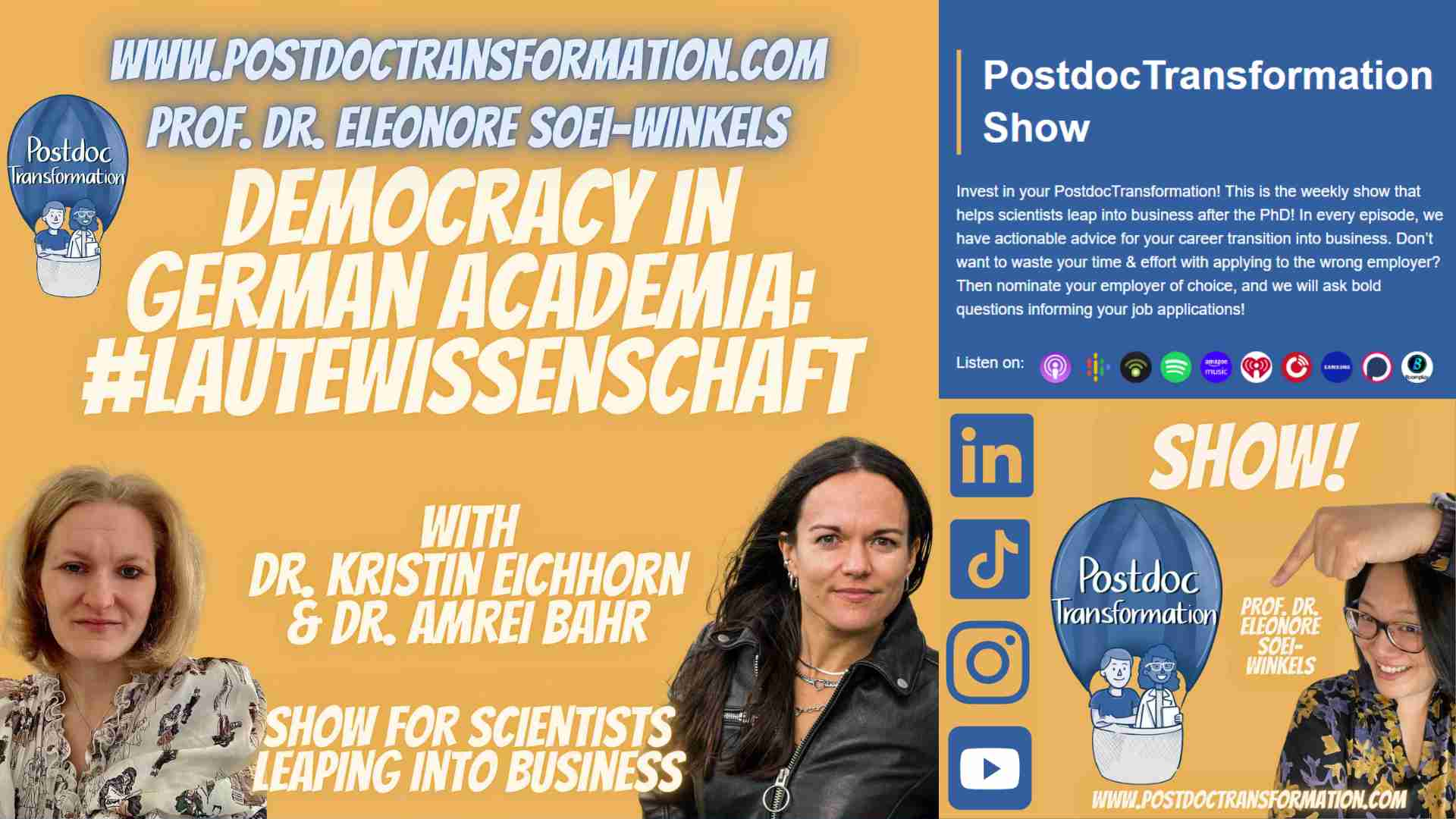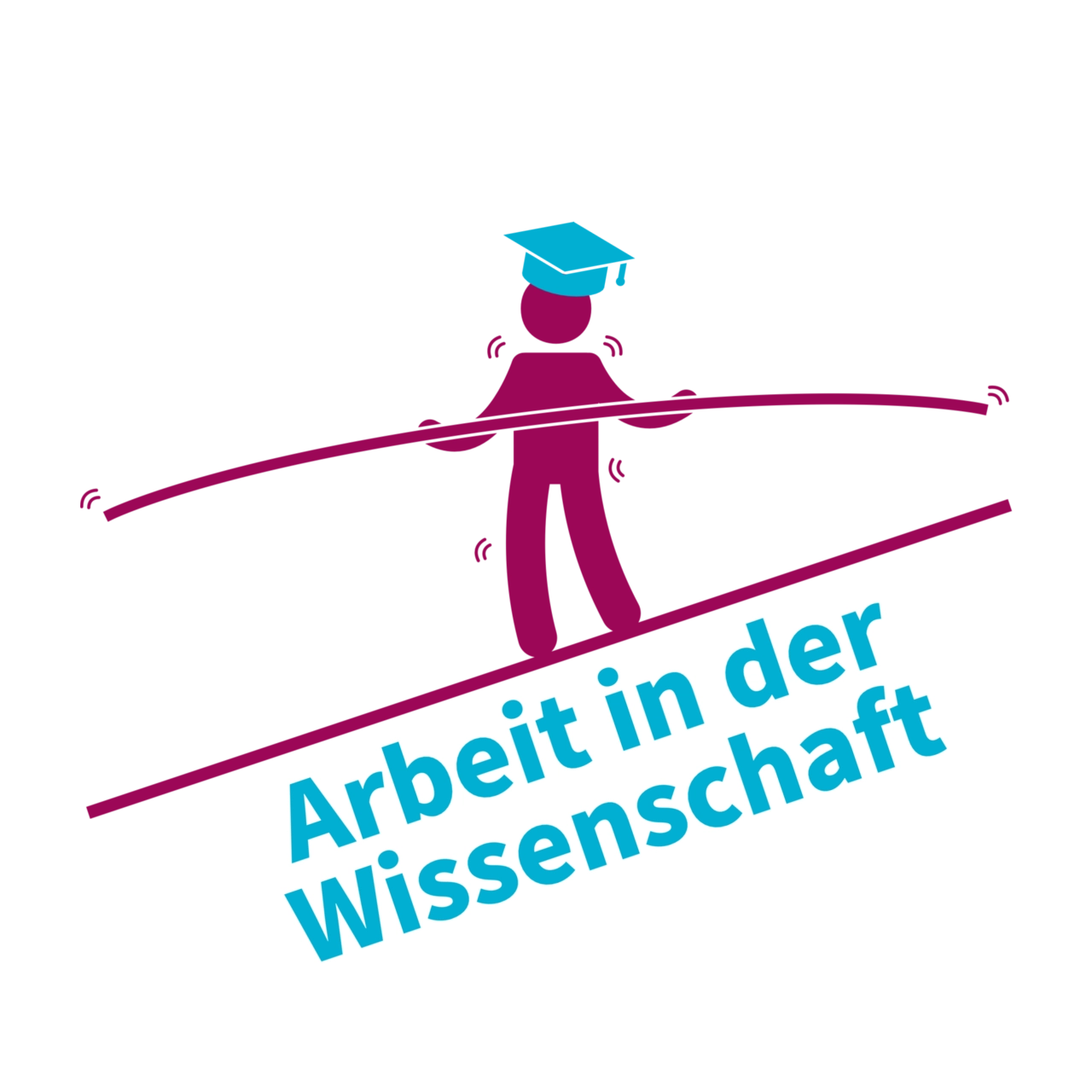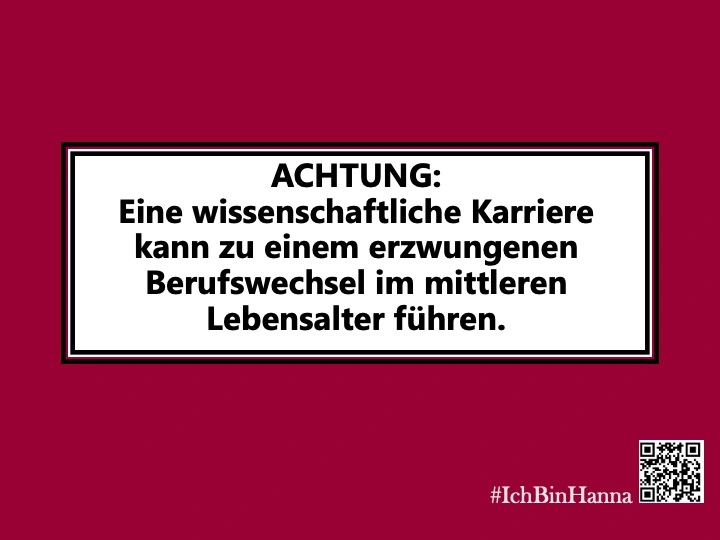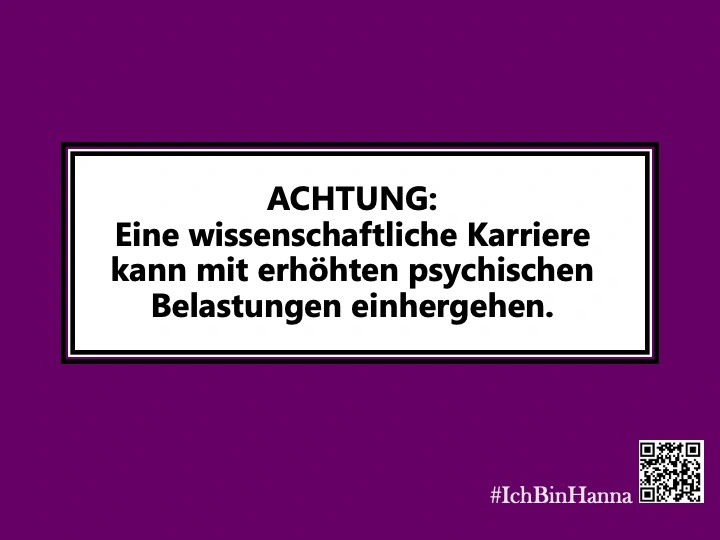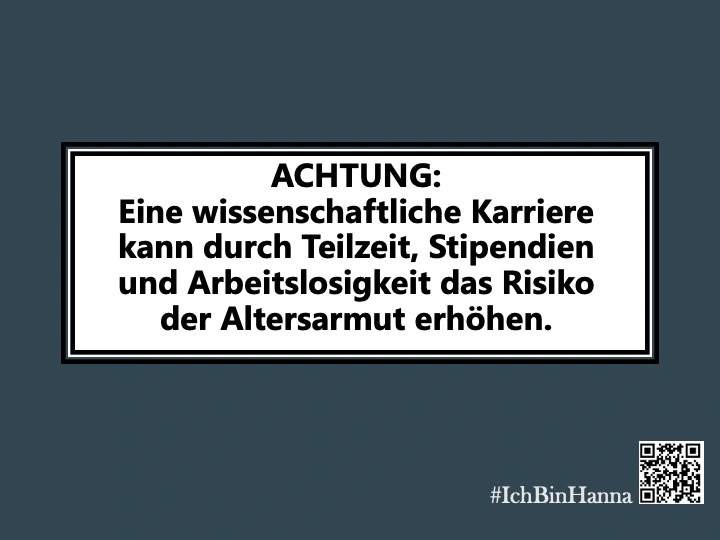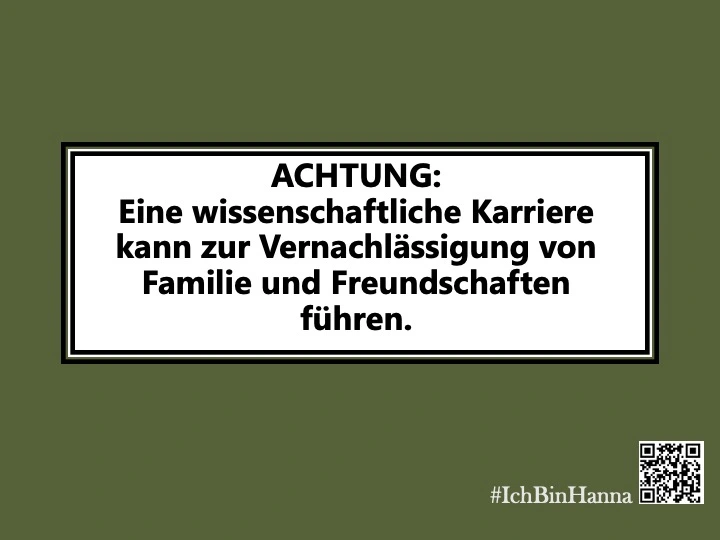This is a must-listen for (international) researchers teaching students in Germany or aspiring to come to Germany. Kicking off season 4 of the PostdocTransformation show, Dr. Kristin Eichhorn is back and speaks with Dr. Amrei Bahr about the challenges facing German academia, including issues related to democracy, precarious working conditions, and the #IchBinHanna movement. They emphasize the importance of academia taking a stand, discussing strategies to address eroding democracy and the need for structural changes within research institutions.
We interviewed inspiring role models, PhD career coaches, entrepreneurs and headhunters for your PostdocTransformation, check them all out!
Subscribe to our weekly show on your favorite podcast platforms: Why? Postdoc scientists & PhD students / candidates will learn the basics for their career transition from research into business & industries AND will get to know a company that hires early career scientists!
Welcome to the season 4 kick-off!
To kick off season four of our PostdocTransformation show, I interviewed Dr. Kristin Eichhorn, who already informed you on the #IchBinHanna movement to raise awareness for the precarious working conditions in German academia. Joining us for the first time is Dr. Amrei Bahr, who is the second of three co initiators of #IchBinHanna next to Dr. Sebastian Kubon.
Dr. Amrei Bahr is a junior professor for philosophy of technology and information at the university of Stuttgart in Germany, check out her research on AI like ChatGPT and digital autonomy in science and education. In 2023, she was awarded by the German business magazine Capital as one of Germany's #Top40under40. Join us as we deep dive into the urgent call for democracy in German academia.
Dr. Kristin Eichhorn and Dr. Amrei Bahr shed light on the challenges, the risks and the essential role each of us plays in preserving democracy.
Get ready for a thought-provoking discussion that will inspire you to raise your voice and be part of #LauteWissenschaft. Stay tuned for an enlightening journey ahead.
Eleonore: So, welcome to the stage, Dr. Amrei Bahr and also Dr. Kristin Eichhorn!
Dr. Amrei Bahr: Hi, it's a pleasure to be here.
Dr. Kristin Eichhorn: Yes, same, thank you for having us again.
[00:02:32] The Current State of Democracy in Germany and Its Impact on Academia
Eleonore: So, to give a little bit of context, I would love Kristin to introduce us, early career scientists all over the world who are maybe looking into a career and a research career in Germany, but also all the others who are already in Germany, what is the current situation in academia, Germany?
Dr. Kristin Eichhorn: We have to take a look at the broader social situation at the moment. Most of your listeners will probably know that we have a particularly dangerous situation for democracy right now, because there was, uh, there was a report by Correctiv who brought into view a situation that there was a meeting at Potsdam where far right activists along with the AFD, CDU and some others were planning to send a lot of people out of the country that do not have a pure German background or if they have some kind of family background where people came from another country, so all these people might be in danger of losing their place in our society. So, and this has led to a huge movement where people go to the streets and demonstrate for democracy.
So, and our point of view is that the research community science has been relatively quiet on the matter. There are a few messages by now step by step, there are universities and put out statements, saying that we have to support democracy and diversity. It would be very important, to talk about this, what that means. Because democracy is not just a thing where science can step aside and say, well, we are neutral, and we can just watch and it doesn't matter what happens outside.
And once you have determined your readiness to leap and want to transition into business or industries, then you can enroll in your free email course with 10 actionable, bingeable email lessons until you start your job in business. You'll get 10 emails like this at zero cost.
1) How to leap out of science.
2) How to build your sustainable LinkedIn profile.
3) How to read social media and network.
4) How to research your favorite jobs and employers.
5) How to do information interviews to get insights.
6) How to create your customized applications with ChatGPT.
7) How to prepare your thesis from a business point of view.
8) How to apply to your favorite employers.
9) How to choose the right job offer.
10) How to prepare for your new job
Enroll now for free.
[00:04:10] Launching #LauteWissenschaft: A Call for Loud Academia
Dr. Amrei Bahr: Yeah, so and that was the reason why we came up with this new hashtag, which is #LauteWissenschaft, which you can translate to maybe either Loud Science or better even #LoudAcademia, because we said, okay, so we have all those statements by different people, by different institutions from all areas of the society, be it soccer or be it from the churches or be it from companies and so on.
But at the point where all those statements were already there, we were wondering, so what do institutions in academia actually do? And also all the people in academia were wondering, what can we do actually, apart from going to those demonstrations and so on. That was something that we wanted to highlight that also people from academia and also institutions from academia have to make very clear that this is dangerous for democracy right now and that we need to position ourselves in those debates.
Dr. Amrei Bahr: And, another topic that we have been dealing with extensively actually as a team was the #IchBinHannah movement. And we saw there already that people are afraid to expose themselves with things that happen inside academia, that happen within science. But here, especially, it is of course something that people now need to do. They need to take a position in this debate and I think the more secure you are, the more important it is to actually do that. Especially with regard to solidarity with everyone, who would then be part of those horrible plans that have been discussed.
We need to be especially loud. So, as a privileged person myself, I think I need to be especially loud in order to make sure that the people that I work with, who might then be part of those plans, that they can stay here. That is of utmost importance, especially because everything that we do rests on this ground of democracy.
And we need to keep that also in academia. I mean, the whole freedom of science is something that comes from democracy, right? And if that is in danger, that is a bad thing for all of us.
Dr. Kristin Eichhorn: And it's not just that. The discussion is often framed like, you know, we are in research and then all the bad things happen outside of academia, right? And that's just not the case, because you can see that we have these tendencies inside of academia. There has been a recent debate about the Netzwerk Wissenschaftsfreiheit, in which I am a little bit involved.
We could talk about this a little bit more if you like. In this situation, this is basically a network that fosters the narrative of cancel culture that we have from the U. S., like that narrative that the left and the political correctness is a danger for research are endangering our freedom of speech.
And also, the Correctiv research has shown that one of their members was part of the Potsdam meeting. So, and he talked about, you know, how do we question legitimately of elections . So that's a huge issue. So these tendencies are right there within the academic system and we need to take a stand against those tendencies.
Eleonore: Thank you, Kristin. I totally agree that academia consists of people, people are different, some of us are far right, unfortunately, some of us are more in the middle and some of us fight for the rest of us.
[00:08:30] The Role of Academic Institutions in Supporting Democracy
Eleonore: So, when we look at academia in the different institutions in the sense of research but also administration, do you think that administration should also be louder on that.
I mean, the individual researcher might have some hurdles or so, but more power would come from the institutions as chancellors, rectors, etc. What would you expect from them?
Dr. Amrei Bahr: Yeah, I think what they are already doing is issuing those statements, and that is important. That is something that we actually asked them to do, to be loud, to raise their voices. But what we see with regard to those statements, even if they are about the whole debate about the Netzwerk Wissenschaftsfreiheit, we see all those generic sentences. Like, we want to save democracy, which is something that I think many people can agree on. But the thing that doesn't really happen right now is to name the actual dangers and risks and to name the actual context that we are talking about. So, the statements that we have, they don't go any further from those generic statements.
What we need right now, and that's also part of taking a position in the whole debate, is to actually talk about what is the issue here, just as Kristin has just done that. Because otherwise, people will just have those statements and say, yeah, well, I can agree to that. But the whole debate that this is really about, namely certain events actually and decisions that were being made, for instance by the, BBAW, the Berlin Brandenburgische Akademie der Wissenschaften, who agreed to have the Netzwerk Wissenschaftsfreiheit in their building and one of their rooms, where they could have an event that was the starting point of the debate and that is something that doesn't appear in very many statements.
And I mean, that's the thing that we are talking about right now. And if we cover this up with generic statements, then I think that's a mistake, actually.
Dr. Kristin Eichhorn: Yeah, I think institutions are doing what they're always doing. You know, they issue a statement because that's what is right now is the trend and they feel obligated to say something, but it's not about what's actually done. It's not just about the statements, it is what you do in everyday life.
And there we can also draw a little connection to #IchBinHannah because, democracy is also a matter of the way academia is structured in itself. And we have that strong hierarchy where the professors have all the say and can do all the things and have all the rights and everybody else is dependent upon them.
So we have a huge gap, because people are on non permanent contracts and so on. This is not a democratic structure in academia itself. So, we have to ask the question, how sincere are these statements given, what the structure behind closed doors is actually like?
Eleonore: Thank you, Kristin, for your explanations.
Hey, PostdocTransformer, are you curious to ask professors, principal investigators, visiting scientists, postdocs, PhD students, and candidates some in depth life and career guiding questions? But it feels cringe, so you end up not asking ...
Buy our [00:05:00] PostdocTransformation Card Game to have more fun and valuable insights in your journal club, lab, and mentoring meetings, lab rotations, during conferences, panels, and breaks at the Mensa.
In the first set of 40 cards you'll get 10 intriguing mentoring questions per career level. 10 for PhD students, 10 for postdocs and 10 for professors.
We have a second set for parents, scientists, underprivileged and underrepresented and underserved scientists. Buy the card sets with our 25 % discount code "Show" (just enter "Show" during the Shopify checkout).
[00:12:09] Empowering Students and Academics to Stand for Democracy
Eleonore: So, Amrei, what do you recommend that I could do with my students, apart from sharing your voice. So, when you are teaching, what are red flags of situations where you see democracy in academia is eroding and how would you then handle those situations?
Dr. Amrei Bahr: Well, I think the students are very active in fighting to save our democracy, at least the ones that I've talked to. And I think it's a good thing to give them space to talk about what they worry about. And I had the feeling when I did that, they also worry a lot and they also do a lot. For instance, they have their own initiatives. They have their own forms of protest and it's a good thing to share that because then maybe other people will join them to discuss what we can do in order to save our democracy. It's very important to do all those protests, of course, but there is so much more that we can do, especially as people who are teaching at universities because, we are people whose voices will be heard, either in teaching or when we, for instance, give a talk somewhere or science communication or something like that. I think it's important to just raise this issue and say the reason why I can do what I can do, is that we have this democracy that I'm standing upon.
And if this changes actually, then that would have bad consequences not only for the whole society, but obviously also for academia. And therefore, I think everywhere where somebody puts a microphone in front of my mouth and lets me say something, it would be a good thing to remind everybody, that we all need to fight for democracy.
Eleonore: Thank you. So, now when we're looking at the whole debate about democracy and science, I admit that I haven't been loud, even though I'm a professor since 10 years. I'm a woman, I'm a mom, I'm a person of color. And I try to play by the rules. For many years I tried to be neutral and to be very objective and not to be personal and everything like that. And I agree with your students when you say they want more. It's not just about the professorship as this as a position, but also it must be filled by values. So, Kristin, do you think, do we need to come out of the box and position ourselves as well.
Dr. Kristin Eichhorn: That is exactly right. What you're hinting at here is that a lot of professors, because they are so they work for the state and they feel that they are obligated to stay objective and neutral. There's this Neutralitätsgebot, however, if you are a professor in Germany, your obligation is of course to the constitution to protect the constitution. So if there are movements or developments in society that threaten the working system and the constitution, then you are actually obligated to step up and do something about that. That's not a problem. What you cannot do is, address particular parties or advertise for other parties. So, that's something you shouldn't do, but what you can do is, of course, stand up and say, here's a particular development that is dangerous for all of us. And that is something we have to do something about.
And I think that's particularly true if these developments come from an area within science. So, we are all so used to being objective, but you should not forget that the enemy, will not play by those rules. They will not be objective. They're ignoring these rules, so if we step back and say, Oh, I can't do that, then the other side is already winning because they're not playing by the rules.
Eleonore: Absolutely agreed. We should teach our students and then early career scientists to have a voice. I feel that in my generation, I'm 42 years old, I was socialized by professors who were not standing up, I'm really happy to have you both here. I think that you represent a new generation of aspiring professors who I want my own children to look up as a role model. And that's why I'm sharing my stage with you so that you can let us know how we can better our leadership within academia.
So, what are the rules and which ones are bypassed by certain voices that erode democracy, Amrei?
[00:16:27] Navigating Politics in Academia: Strategies and Awareness
Dr. Amrei Bahr: I think what Kristin pointed out excellently in her piece on the blog by Jan-Martin Wiarda was that we have a certain confusion here. So, people in academia tend to think that the rules that apply, are the ones that we are used to in science, right? So we will convince other people if we have good arguments, they will be convinced actually.
So, we have this open discussion and that's the thing that we are doing. And what, Kristin pointed out was that, this is not what is happening here, right? We are not in the area of academia and science, but we are in the area of politics. That doesn't mean that politics is fundamentally different. Of course, I would say at least after all those years of activism, that good arguments are important.
You can convince people with good arguments as well, but you also need to take into account that the actors that are involved in those debates, they don't all play by the same rules. And we see that especially when it comes to those people who are not in the democratic spectrum anymore, they will Use everything that they can use to manipulate, for instance, a certain debate.
So, they will not be convinced by your good arguments because they don't care. They will derail the whole debate. For instance, you will talk about a certain issue and then they will talk about something else. And all those strategies that are being used, are something I think that people in academia are not sufficiently aware of actually.
We need to distinguish carefully between what we are doing in academia and science and what is happening in this realm of politics. And then we need to make sure that if we position ourselves as, people from academia, as scientists, as scholars, then we need to be prepared for that. And I think that is something that Kristin really excellently pointed out that we cannot just, rely on those rules, but we need to expect some people to do something completely different. And if we don't then have something to react appropriately, then that's something that is risky, I think.
So, we need to come up with strategies how to deal with those people who will just say I don't care about any rule "I just want to make my point here no matter what", because that is something that is bad, as well as in academia, and we shouldn't let people go through with that.
I think that that really was a lot of food for thought to let me also reflect on how I teach and this is one of the special occasions where I talk to other professors and see that it is important to change because if we don't say anything, the others have already won. And which of the blog posts or other things that you have done and mentioned are worthwhile to note here.
Have you found this episode so far helpful for yourself? Well, maybe you can subscribe on YouTube, Spotify, Apple Podcasts, Podbean, or wherever you get our show. And also, share this episode with your PhD bestie because that would encourage us to help the underprivileged, underrepresented, and underserved early career scientists leaping into business.
This would also ensure that you don't miss a future episode. Also, our subscription and listening numbers are key for finding the right sponsors for our show so that we can help you for free. And now back to the show.
Dr. Kristin Eichhorn: I think the whole debate about this situation in the Berlin Wissenschaften, I think that's noticeable. So, there were two blog posts on Jan-Martin Wiarda, one by me, and then the response by the president of the BBAW, Christoph Markschies, and there are other parts of the debate, Geraldine Rauch, the president of the Technische Universität Berlin has said something about it.
So, all these things are in German, sadly. So, we don't have much English speaking material yet. Definitely you should check out Amrei's newsletter #ArbeitenInDerWissenschaft. Because there's one newsletter where she sums up the whole debate, but she will probably, I assume, be writing about this issue more often in the future.
So, check that out. And I mean, it's not that difficult today to find, an app that will help you translate it into English in case you're not so good with German. So, I think that's a, probably a good strategy to stay up to date.
[00:20:46] Building a Community for Democracy: #LauteWissenschaft and Beyond
Dr. Amrei Bahr: Yeah, and also what you can do is follow the hashtag #LauteWissenschaft. That is also something you can not only follow it, but you can also post things. For instance, if your university or research institution issues a statement as well, we try to collect all of them with this hashtag. But also if you do yourself something that, you would say is "laute Wissenschaft", is raising your voice for democracy, for instance, in teaching or in your research, presentation or whatever, then you can also indicate that there because other people might be inspired. And that's, I think, also a good thing that we work together there. And that is something that we have seen excellently with the whole #IchBinHanna thing, that people are a community.
They share what they are doing. They support each other. And I think that is something thing that we can also do here, and it's very important, and we can even do it here with many more people because it's something that is not something exclusively about people in academia, and their job situation, which of course also affects, affects other people in society. But here we have something that is obviously something that we all should care about. So we need, those broad communities, and we need to share our experiences, share if we have good ideas, then other people might be inspired, and I think that's also important.
Eleonore: Perfect.
[00:22:05] Conclusion and Resources
Eleonore: And I'll make sure to link all the things that you have mentioned the resources, but also the hashtags or every, you know, all your social media channels, I will link in the show notes. So, make sure that you find them. And I absolutely agree. I'm also one of the recipients of Amrei's newsletter. And every time I get this, it's really like I hear the voice of someone who should be heard and who makes a difference. And I hope that with this episode of the PostdocTransformation Show, we make a difference, especially for those who live in Germany who are impacted by the whole issue of eroding democracy in German academia.
Eleonore: And just in case you are now curious about #IchBinHanna in Germany and the episode with Dr. Kristin Eichhorn. I want you to listen to this bit.
Dr. Kristin Eichhorn:
You have to know that #IchBinHanna is originally a Twitter campaign that I've done with Dr. Amrei Bar and Dr. Sebastian Kubon. It's important to know that "Ich bin Hanna" means "I am Hanna". The question is, who is Hanna? Hanna is a character from a video that was done by the ministry for education. And they were trying to explain.
The law that gives way to hiring people on non permanent contracts in research. Because in Germany, there's a specific law that allows researchers on non permanent contracts for six years before their PhD and for another six years after a PhD. This is an employment situation that would not be legal in another field.
This is specifically for for researchers, they presented this whole situation in the video. I like, this is a really great thing. I like innovation is necessary, needs fluctuation to, to come through. And then they had this nice phrase where they said, uh, one generation should not clog the system. Basically, we all just have to leave science in the end.
So another generation has the great chance of experiencing that work environment and I'll get their PhDs and other qualifications. A little bit about the situation and the way we work, the short term contract, sometimes people are hired only for a year or just a few months. If you're lucky, you get a three year contract and that situation can last very long in your career.
Most researchers, if they stay in science will probably end up in their mid forties and they either find a professorship, which is hard to do, or they drop out and then they have to find another job. And that's obviously very hard to do when you are that far in your career and you have never done anything else.
Depending on your field, it might be harder or easier. But in general, this is just a situation that is not very good. So we have no, almost no permanent contracts. You have people working overtime without pay, uh, giving up everything, leaving their families from Tuesday to Thursday because they're living in another town because they have to commute hundreds of kilometers and so on.
So,this is a very bad situation. And I think it's been known in search circles for a long, long time, but it wasn't really until the pandemic until we managed to build up over Twitter, a community that actually addresses these issues. So we started with another campaign where we collected 95 theses against the law.
That was a little funny thing on Reformation Day. If you're familiar with Martin Luther, he had these 95 theses. So we did a little. But the really successful thing was Ich bin Hanna, where we identified with Hanna as a character. This is a fictional character for whom everything is great. We said we identify and we show the real people and their real struggles behind that.
How we get a more realistic picture of what that looks like. That turned out quite successful. There's a good narrative for the press as well. So that's the general situation.
Eleonore: Dr. Amrei Bahr, Dr. Kristin Eichhorn and Dr. Sebastian Kubon have also published a book on #IchBinHanna about prekäre Wissenschaft in Deutschland. And I want you to read that if you are an early career scientist in Germany, or want to become one. Because that really is eye-opening.
And this is another important message by Dr. Kristin Eichhorn for international scientists leaping into Germany's academia.
Dr. Kristin Eichhorn: Especially people who come from abroad, they need to know what situation they're in, because very often when they have a non permanent contract, they don't get to stay in the country because, you know, then their right runs out. They have to go back to their own country because they have no contract or the contract comes only a day before they start working.
So, there's a lot of problems, uh, international researchers have that we as German citizens will not have. So it's very important, I think, so at least to know what system you're working in, even if you don't protest against it, just for your own survival, it's very important that you know what the situation is.
So, if you have access to the information and you know colleagues who don't, spread the word.
Eleonore: Dr. Kristin Eichhorn also shares something on research institutions that is probably not just confined to German academia, but applies worldwide. You know, the research institutions mostly want things to remain as they are. So if they can just hire a staff and let them go again, there's really a lot of activism against a general change of the system, which we so desperately need, not just for researchers, but it's also science itself suffers from that because we already have.
Problems finding people to hire here. And then you have all these short term projects that end somewhere and all public money that gets wasted just because a project is started. And then you build on a website where you buy a big, I don't know, some big device that is super expensive. And then the person who knows how to handle this, how to do the research is gone because their contract has run out.
So this is a really bad situation, but it's very hard to bring about change.
Don't miss out on the general advice for PhD students, postdocs, but also even for a bachelor and master students by Dr. Kristin Eichhorn in her own episode, which I will link in the show notes. By the way, this was one of the most favorite episodes of season three.
Eleonore: Whew, we kicked off season four of our PostdocTransformation show or for a scientist leaping into business on a high note.
Season four is themed future of work in various industries.
So stay tuned, subscribe to not miss out for your PostdocTransformation. Woo.
Hey, do you want to boost your PostdocTransformation and gain practical business experience? Click below to apply for a podcasting business internship with us!
And did you know that we offer deep dive e-course workshops and memberships at graduate schools? Maybe also at yours in the future. Ask your graduate school coordinator, whether they want to book my services so that I can deliver them to you 24 seven, 365 on your mobile device.
And even better, if you get us paid by your grad school, we will pay you 50 percent recurring sales commissions.
So, you will earn money with us as we help you and your PhD besties to [00:05:00] transition into business. We can build our PostdocTransformation together.

And now it's time to thank Company ABC who sponsors this episode of the PostdocTransformation Show. I will now be reading the company's answers to one of six bold [00:10:00] questions so that you can choose to apply. For example, number one, describe your most valuable experts versus leaders in your company.
Have they typically earned a doctor title? Number two, for whichever company roles or units do you encourage somebody with a doctor title to apply? Number three, how would you describe your organizational culture in which your most valuable experts and leaders thrive in? To nominate an employer of choice so that we can ask our own formative bold questions let us know via the click on the link.
If you are a company representative like in recruiting and employer branding. And now you want your company to be highlighted as an employer of choice for our audience. You can become a sponsor of a dedicated PostdocTansformation show episode. Just click the picture below and now back to the episode.

